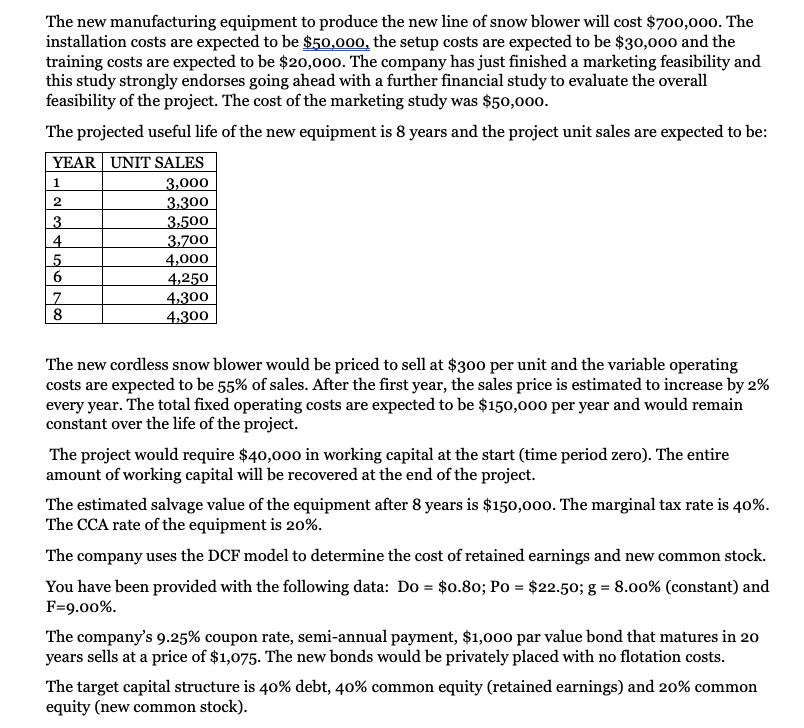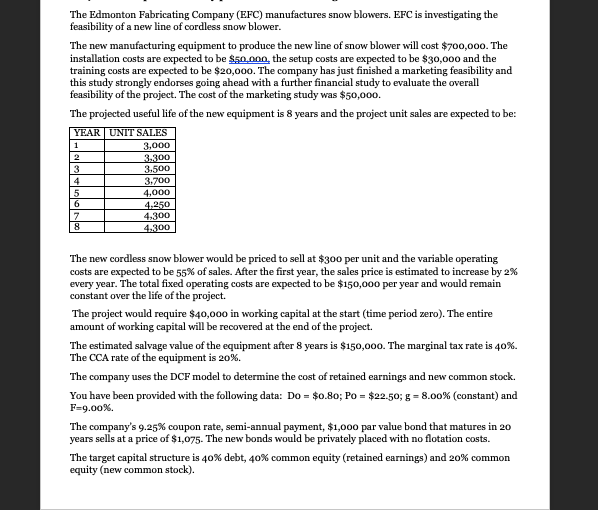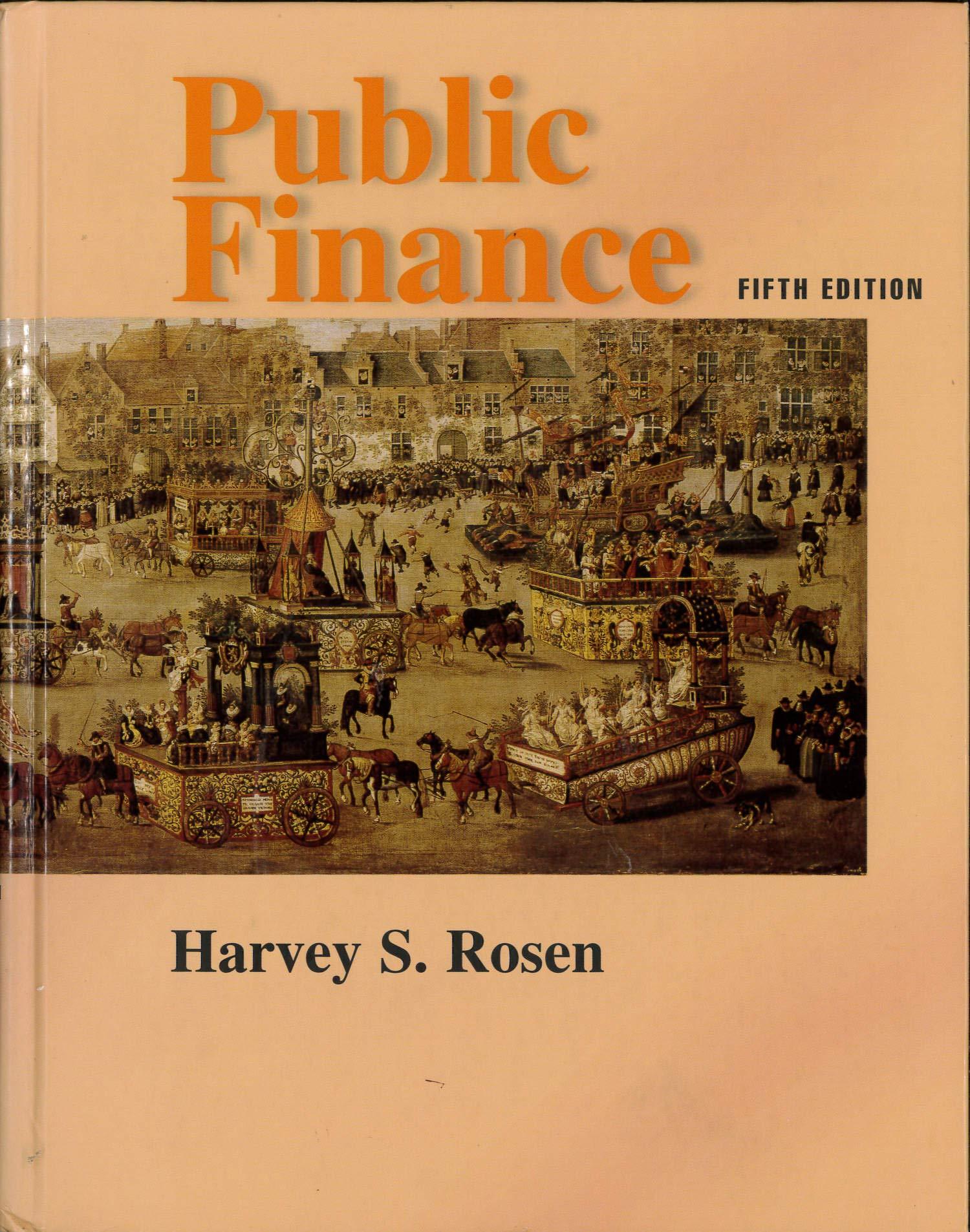Answered step by step
Verified Expert Solution
Question
1 Approved Answer
What is the net present value of this project? Should the project be undertaken by Edmonton Fabricating Company (EFC)? *Please show all information in excel


What is the net present value of this project? Should the project be undertaken by Edmonton Fabricating Company (EFC)?
*Please show all information in excel sheet as well as all steps for each year*
The new manufacturing equipment to produce the new line of snow blower will cost $700,000. The installation costs are expected to be $50,000, the setup costs are expected to be $30,000 and the training costs are expected to be $20,000. The company has just finished a marketing feasibility and this study strongly endorses going ahead with a further financial study to evaluate the overall feasibility of the project. The cost of the marketing study was $50,000. Nano The projected useful life of the new equipment is 8 years and the project unit sales are expected to be: YEAR UNIT SALES 3,000 3,300 3,500 3,700 4,000 4,250 4.300 4,300 The new cordless snow blower would be priced to sell at $300 per unit and the variable operating costs are expected to be 55% of sales. After the first year, the sales price is estimated to increase by 2% every year. The total fixed operating costs are expected to be $150,000 per year and would remain constant over the life of the project. The project would require $40,000 in working capital at the start time period zero). The entire amount of working capital will be recovered at the end of the project. The estimated salvage value of the equipment after 8 years is $150,000. The marginal tax rate is 40%. The CCA rate of the equipment is 20%. The company uses the DCF model to determine the cost of retained earnings and new common stock. You have been provided with the following data: Do = $0.80; Po = $22.50; g = 8.00% (constant) and F=9.00% The company's 9.25% coupon rate, semi-annual payment, $1,000 par value bond that matures in 20 years sells at a price of $1,075. The new bonds would be privately placed with no flotation costs. The target capital structure is 40% debt, 40% common equity (retained earnings) and 20% common equity (new common stock). The Edmonton Fabricating Company (EFC) manufactures snowblowers. EFC is investigating the feasibility of a new line of cordless snow blower. The new manufacturing equipment to produce the new line of snow blower will cost $700,000. The installation costs are expected to be $50.000 the setup costs are expected to be $30,000 and the training costs are expected to be $20,000. The company has just finished a marketing feasibility and this study strongly endorses going ahead with a further financial study to evaluate the overall feasibility of the project. The cost of the marketing study was $50,000. The projected useful life of the new equipment is 8 years and the project unit sales are expected to be: YEAR UNIT SALES 3,000 3.200 3.500 3.700 4,000 4.250 4.300 4.300 The new cordless snowblower would be priced to sell at $300 per unit and the variable operating costs are expected to be 55% of sales. After the first year, the sales price is estimated to increase by 2% every year. The total fixed operating costs are expected to be $150,000 per year and would remain constant over the life of the project. The project would require $40,000 in working capital at the start time period zero). The entire amount of working capital will be recovered at the end of the project. The estimated salvage value of the equipment after 8 years is $150,000. The marginal tax rate is 40%. The CCA rate of the equipment is 20%. The company uses the DCF model to determine the cost of retained earnings and new common stock. You have been provided with the following data: Do = $0.8o; Po = $22.50; -8.00% (constant) and F-9.00% The company's 9.25% coupon rate, semi-annual payment, $1,000 par value bond that matures in 20 years sells at a price of $1,075. The new bonds would be privately placed with no flotation costs. The target capital structure is 40% debt, 40% common equity (retained earnings) and 20% common equity (new common stock)Step by Step Solution
There are 3 Steps involved in it
Step: 1

Get Instant Access to Expert-Tailored Solutions
See step-by-step solutions with expert insights and AI powered tools for academic success
Step: 2

Step: 3

Ace Your Homework with AI
Get the answers you need in no time with our AI-driven, step-by-step assistance
Get Started


